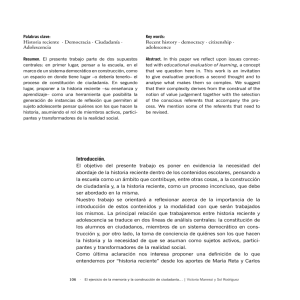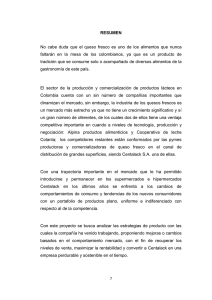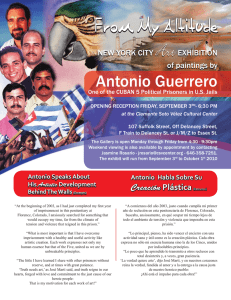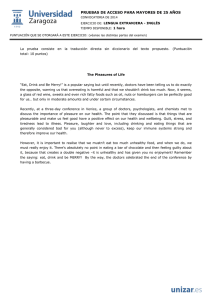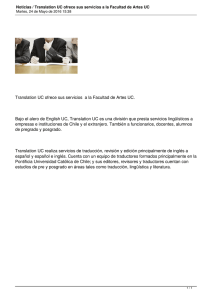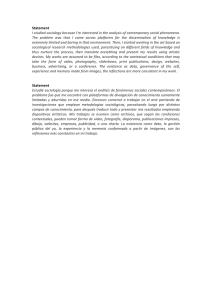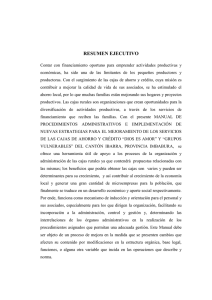More students` quotes after conversation with Mike
Anuncio
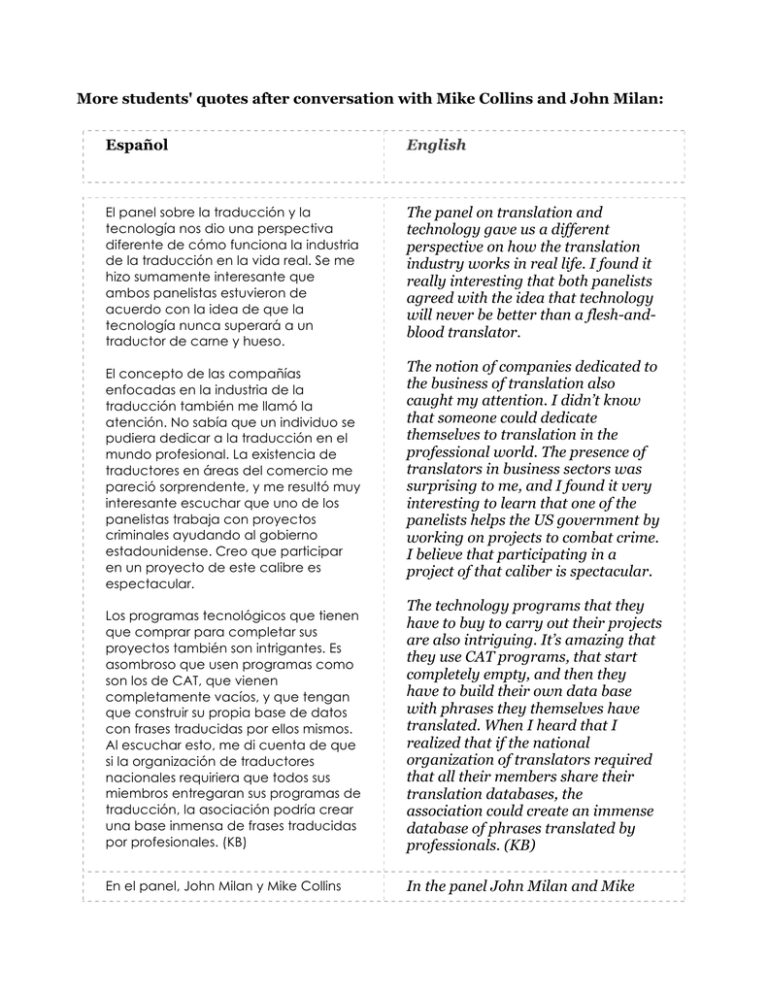
More students' quotes after conversation with Mike Collins and John Milan: Español English El panel sobre la traducción y la tecnología nos dio una perspectiva diferente de cómo funciona la industria de la traducción en la vida real. Se me hizo sumamente interesante que ambos panelistas estuvieron de acuerdo con la idea de que la tecnología nunca superará a un traductor de carne y hueso. The panel on translation and technology gave us a different perspective on how the translation industry works in real life. I found it really interesting that both panelists agreed with the idea that technology will never be better than a flesh-andblood translator. El concepto de las compañías enfocadas en la industria de la traducción también me llamó la atención. No sabía que un individuo se pudiera dedicar a la traducción en el mundo profesional. La existencia de traductores en áreas del comercio me pareció sorprendente, y me resultó muy interesante escuchar que uno de los panelistas trabaja con proyectos criminales ayudando al gobierno estadounidense. Creo que participar en un proyecto de este calibre es espectacular. Los programas tecnológicos que tienen que comprar para completar sus proyectos también son intrigantes. Es asombroso que usen programas como son los de CAT, que vienen completamente vacíos, y que tengan que construir su propia base de datos con frases traducidas por ellos mismos. Al escuchar esto, me di cuenta de que si la organización de traductores nacionales requiriera que todos sus miembros entregaran sus programas de traducción, la asociación podría crear una base inmensa de frases traducidas por profesionales. (KB) En el panel, John Milan y Mike Collins The notion of companies dedicated to the business of translation also caught my attention. I didn’t know that someone could dedicate themselves to translation in the professional world. The presence of translators in business sectors was surprising to me, and I found it very interesting to learn that one of the panelists helps the US government by working on projects to combat crime. I believe that participating in a project of that caliber is spectacular. The technology programs that they have to buy to carry out their projects are also intriguing. It’s amazing that they use CAT programs, that start completely empty, and then they have to build their own data base with phrases they themselves have translated. When I heard that I realized that if the national organization of translators required that all their members share their translation databases, the association could create an immense database of phrases translated by professionals. (KB) In the panel John Milan and Mike hablaron sobre sus experiencias y su forma particular de trabajar como traductores. Me sorprendió que al contrario de la interpretación, la traducción sea un proceso tan solitario. Al trabajar en los proyectos de nuestro curso me he dado cuenta de la importancia de la colaboración. Es por eso que me resultó interesante escuchar que los traductores no la usan como recurso habitual, sino que confían más en Internet. Durante su charla también pude reflexionar sobre otra diferencia entre la traducción y la interpretación. En la traducción uno tiene que pensar mucho en cada palabra, expresión o concepto y tratar de ser fiel al significado. En la interpretación, uno tiene más libertad e interpreta lo que puede de forma mucho más inmediata. La traducción es más rígida. La traducción no puede omitir cualquier cosa. Por ejemplo, Jackie Metivier hablaba de cómo cuando alguien contó un chiste con una gran carga cultural, una vez en lugar de tratar de interpretarlo, se dirigió al público y con honestidad le dijo: “Él contó un chiste, por favor ríanse.” En la traducción, es importante que el chiste se traduzca fielmente, algo que exige un alto nivel de creatividad. (RG) Me gustó mucho el panel presentado por Mike Collins y John Milan. Fue muy interesante aprender y escuchar sobre su extensa experiencia. Fue una inspiración poder ver a personas con tanta pasión por las lenguas, que llevan trabajando más de 20 años y han llegado a crear sus propias compañías. Además, fue impresionante escuchar que pueden entender, leer y traducir tantas lenguas distintas. Es algo Collins spoke about their experiences and their individual work methods as translators. I was surprised to hear that unlike interpretation, translation is such a solitary process. Our work on class projects has taught me the importance of collaboration, and that is why it was so interesting to hear that translators do not recur to it as a matter of course, but that instead they rely more in the internet. During their talk I also reflected on another difference between translation and interpretation. When you translate you can think at length about each word, expression, or concept, and you can try to be faithful to the meaning. When you interpret, you have more freedom and you interpret what you can in a much more immediate form. Translation is more rigorous. Translation can’t leave anything out. For example, Jackie Metivier talked about how when a speaker told a culturally-charged joke, once, instead of trying to interpret it, she simply addressed the audience directly and instructed them: “He told a joke, please laugh.” In translation, it is important that the joke be translated faithfully, something that demands a great degree of creativity. (RG) I really like the panel presented by Mike Collins and John Milan. It was really interesting to listen and learn about their extensive experience. It was inspiring to be able to meet people with so much passion for languages, who have been working for over 20 years, and who have created their own companies. In addition, it was impressive to hear that they can understand, read, and realmente increíble por la gran cantidad de vocabulario diferente que hay que saber y por el dominio que hay que tener, para poder producir traducciones de una calidad profesional. (OS) translate so many different languages. That is really incredible because of the large amount of different vocabulary that you have to know and the command of the language that you have to have, in order to produce translations of professional quality. (OS) No podría haber hecho las traducciones para la clase sin el uso del internet y otras tecnologías que nos ofrecen un millón de referencias y herramientas. Según John y Mike, algunas personas piensan que la tecnología va a llegar a sustituir a los traductores, pero no estoy de acuerdo. Pienso que la traducción siempre va a necesitar de personas que hablen dos o más lenguas que nos aseguren que la máquina traduce bien. Además, la traducción necesita personas que pueden traducir nuevas palabras ya que las lenguas siempre están cambiando. Mike y John nos dijeron que les gusta su trabajo porque no paran de aprender nuevas cosas. (ACC) I couldn’t have done the translations for class without using internet and other technologies that offer us a million references and tools. According to John and Mike, some people think that technology will one day replace translators, but I don’t agree. I think that translation will always need people that speak two or more languages to vouch that the machine is translating correctly. Also, translation will always need people who can translate new words, since languages are always changing. Mike and John told us that they like their job because they never stop learning new things. (ACC)
